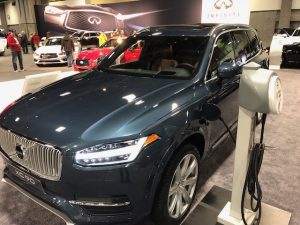 Electric vehicles are heavily subsidized by the federal, state, and local governments. Based on a study I just completed, the federal subsidies for electric vehicles are worth over $42.7 billion to their recipients over the lifetime of the programs. They include the federal grant and loan programs for manufacturers, and the consumer tax credits worth $7,500 per consumer.
Electric vehicles are heavily subsidized by the federal, state, and local governments. Based on a study I just completed, the federal subsidies for electric vehicles are worth over $42.7 billion to their recipients over the lifetime of the programs. They include the federal grant and loan programs for manufacturers, and the consumer tax credits worth $7,500 per consumer.
State and local governments also provide tax credits to purchase electric vehicles (up to $7,500 per consumer), subsidize investments in charging stations, and even offer perks such as access to HOV lanes, access to free vehicle charging, and free meter parking (in Hawaii).
Then there is California. California mandates that zero-emission vehicles (ZEVs) must comprise a set percentage of the automobile market, along with the nine other states that have adopted California’s policy. Under current law, ZEVs must equal 22 percent of the market by 2025. All companies that do not sell their designated share must: pay a $5,000 fine per ZEV credit they are short; purchase credits from companies whose ZEV sales exceed their requirements; or sell ZEVs in California at lower prices to increase market share, possibly risking a financial loss. As many companies who fall short choose to purchase credits from companies whose ZEV sales exceed their requirement, the sales mandate has become a large subsidy to select electric vehicle manufacturers, such as Tesla who has earned $700 million in credit sales to date.
There are also distributional impacts of subsidies for electric vehicles. IRS Statistics of Income data illustrate that, for the 2014 tax year, 78.7 percent ($207.1 million) of the federal consumer tax credits were received by households with an adjusted gross income (AGI) of $100,000 or above. A further 20.5 percent of the tax credits ($54.1 million) were received by households with an AGI between $50,000 and $100,000. Put differently, over 99 percent of the total tax credits went to households with an AGI above $50,000.
Putting it all together, the size of the EV subsidies are substantial, EV subsidies favor certain competitors over others, and the subsidies benefit upper-income households at the expense of lower-income households. These realities raise serious questions regarding the wisdom of the current subsidy policies.
The answer to your first question is yes, EV subsidies have improved the viability of an unsubsidized EV market as shown by the recent introduction of mid-priced cars such and… Read more »
Dan, I agree with you that ICE technology should not be subsidized. Neither should ethanol or other low emission technologies. While your premise that electric vehicles may be the future… Read more »
Wayne, you say that you agree that ICE vehicles should not be subsidized. But the real ICE subsidies are already orders of magnitude higher than the EV subsidies you complain… Read more »
Dan, I can’t help but disagree with the concept that the total amount of ill-advised subsidies can be decreased by paying more money out in subsidies — to any part… Read more »
Wayne: Of course one subsidy can reduce the amount paid for other subsidies. For example, the direct subsidies for oil (and, therefore, for ICE vehicles) are about $20.5B/year: https://www.vox.com/energy-and-environment/2017/10/6/16428458/us-energy-subsidies The… Read more »
Wayne: Apart from the issue of subsidies that we discussed above, in your report you state: “there are several studies that question whether EVs will, universally, create a net environmental… Read more »
Dan, you are confusing two issues when you raise cancer research, or even research into battery electric vehicles if conducted by the federal government — note this is basic scientific… Read more »
Wayne: As you point out, there are many issues regarding EVs that need to be addressed. But I think you are missing my main points: 1. You are ignoring the… Read more »
As we have seen subsidies for natural gas exploration, solar energy, biofuels, and now electric vehicles — all ‘modern’ subsidies allow higher cost technologies first to enter the market, and… Read more »
The issue of whether subsidies to EVs favor the wealthy is quite similar to the issue of net metering for solar systems. People who were financially better off and owned… Read more »